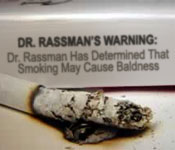Hi doc, I was wondering if sleeping late and waking up late had something to do with hairloss.
And I would also like to point out that according to hairlosstalk.com, nizoral should be used with propecia to get optimal results.
“It is a little known fact that the FDA trial participants all used a shampoo like Nizoral for the duration of the trial. This was required, as the increased sebum production, inflammation, and irritation caused by the balding process can limit the effectiveness of any treatment. This is why it is STRONGLY recommended that a regimen including Propecia also include Nizoral shampoo used once every 3 days in rotation with your normal shampoo. You will not see optimum results without Nizoral, or a shampoo like it, in your regimen.” (from HairLossTalk.com)
Sleeping late and the build-up of sebum should not impact hair loss. Many times I use the example of the homeless people that live on the streets that rarely wash their hair (both men and women). You probably do not see all of them balding, despite the probable massive build-up of sebum. There is too much focus on sebum (waxy substance secreted by the hair follicles) when in actuality, male hair loss is genetic and not related to sleeping late.
As for the Propecia / Nizoral regimen, I did review the link you supplied. There is a single reference to Neutrogena Corp. products used in the study group. I do grant you that this added piece of information does put more than one variable into the scientific study, which might raise questions on the contribution of the shampoo. Thanks for the link and the information you supplied. I am sure that the readers of this blog will be interested in it.
![]()
![]()
Paid advertisements (not an endorsement):



 It is well known that smoking and tobacco products have adverse health effects. Nicotine in tobacco products are known to constrict blood vessels. This could lead to poor circulation and possible hair loss. To see this effect (of poor circulation) squeeze your nail bed until it turns white and see how quickly it returns to its natural pink color (it should be under 2 seconds). Compare the time difference after smoking a cigarette. You will see that the blushing time changes. Some hair transplants surgeons feel strongly that the effect of nicotine on scalp circulation is reduced more significantly when a hair transplant is done, leading to poorer growth of the grafts and less than idealized results.
It is well known that smoking and tobacco products have adverse health effects. Nicotine in tobacco products are known to constrict blood vessels. This could lead to poor circulation and possible hair loss. To see this effect (of poor circulation) squeeze your nail bed until it turns white and see how quickly it returns to its natural pink color (it should be under 2 seconds). Compare the time difference after smoking a cigarette. You will see that the blushing time changes. Some hair transplants surgeons feel strongly that the effect of nicotine on scalp circulation is reduced more significantly when a hair transplant is done, leading to poorer growth of the grafts and less than idealized results.